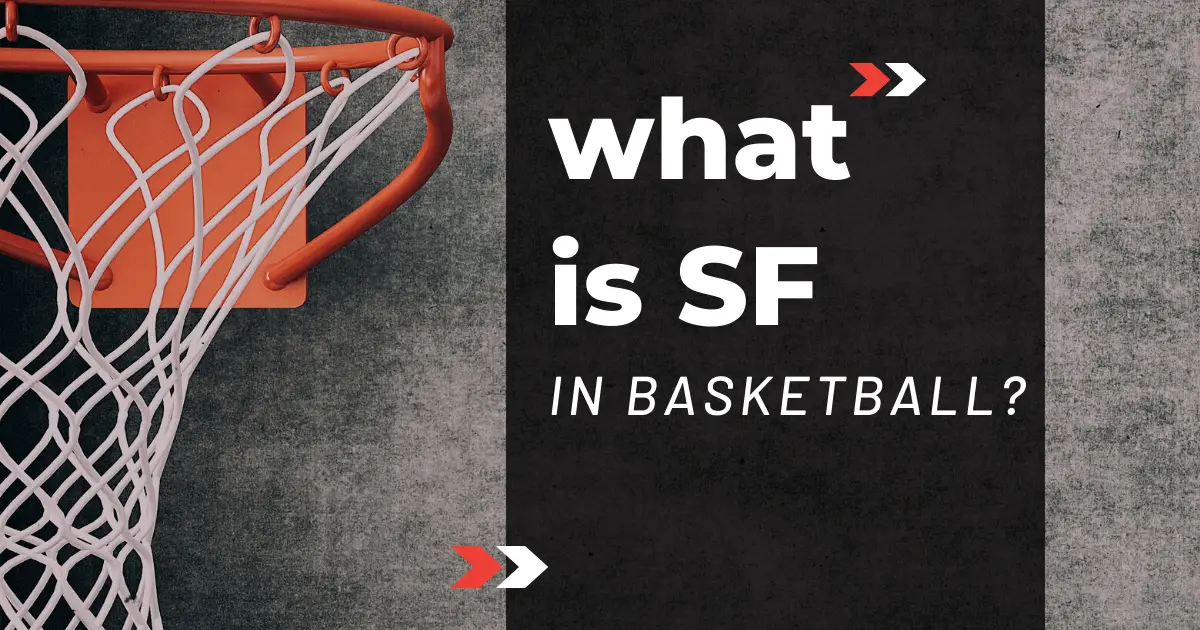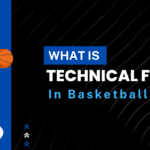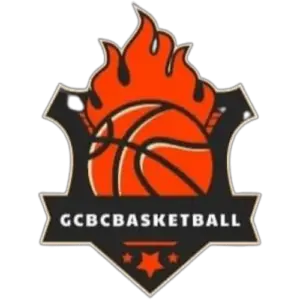In basketball, the SF or small forward position is a critical one. It’s the link between the guard and post-player positions, responsible for a variety of roles on both ends of the court. An effective small forward must possess physical strength and agility, as well as an expansive knowledge of offensive and defensive play.
At its core, the SF role calls for versatility; they must be able to drive to the basket with ease while also having enough skills to back out their defender in order to create space for jumpers or set up teammates with scoring opportunities. The modern game has evolved this role into more than just an all-arounder though; many SFs have become elite scorers and defenders due to their unique blend of size and speed.
How Do You Play SF In Basketball?
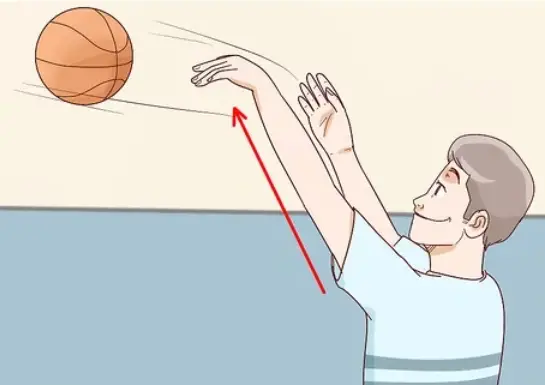
To play SF effectively you must have a good understanding of the game.
- Read the defense quickly and anticipate where your teammates and opponents will be on offense or defense.
- As a small forward, you need to be able to drive to the basket with confidence and take open jump shots when needed; you should also have strong ball-handling skills for creating plays for yourself or others.
- Being able to rebound well both offensively and defensively is also key for this position since it can help ignite fast breaks or prevent fast break opportunities from your opponents.
The Role Of SF In Basketball:
The importance of the role of small forwards in basketball cannot be overstated. On both defense and offense, SFs are key components in any team’s success.
Roles On Defense:
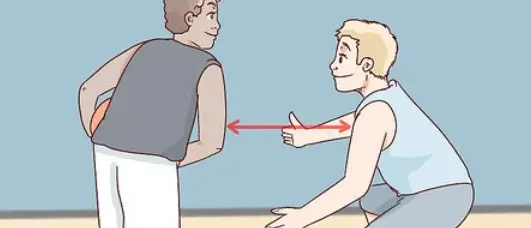
On defense, small forwards play an essential role in disrupting opponents’ offensive efforts. They must be able to guard multiple positions since they often switch from defending a point guard to a power forward within seconds. Additionally, SFs need to be agile enough to stay with speedy guards while still having enough strength to battle against big men down low. Their ability to pressure opposing ball handlers is also invaluable for creating easy transition opportunities for their team.
Roles On Offense:
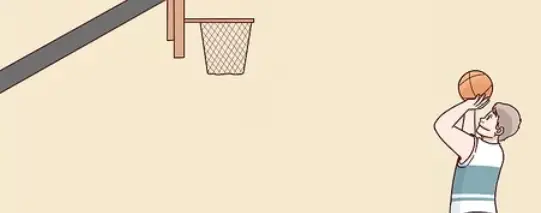
Small forwards are usually tall enough and athletic enough to play both inside and outside, making them invaluable assets when it comes to offense. They can provide perimeter defense against opponents’ guards while also having the ability to penetrate into the paint or shoot long-distance three-pointers.
Types Of Small Forwards:
Wing Players:
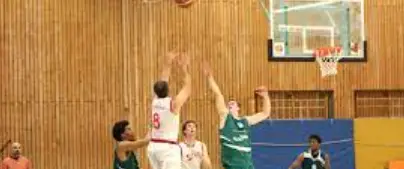
Wing players make up the two positions of shooting guard and small forward in basketball. There are two major types of wing players in basketball – perimeter shooters and slashers – each with their own unique style of play.
Perimeter shooters are highly skilled at making shots far away from the basket, usually beyond the three-point line. Players who specialize in this type of game often have good footwork and quick releases that enable them to get open for shots quickly. They also need to be able to read defenses effectively so they can find gaps that allow them to get off uncontested shots.
Slashers, on the other hand, rely more heavily on their athleticism than their shooting ability.
Swingmen:
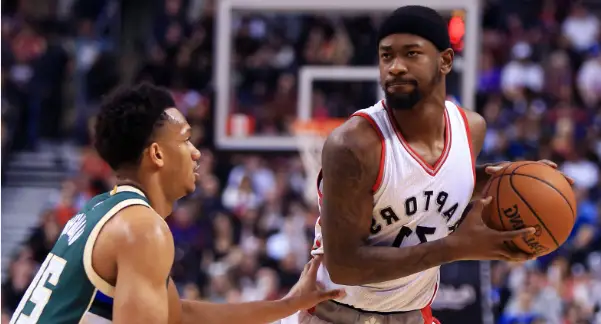
As the name implies, a swingman in basketball is an all-around athlete who can play multiple positions on the court. Swingmen typically possess a combination of size, strength, speed, agility, shooting ability, and excellent decision-making skills that make them well-rounded basketball players.
What Is SG In Basketball?
Shooting Guard (SG) is a position in the game of basketball. It is usually played by someone of average to above-average height and athleticism. The SG’s primary role is to score points for the team by shooting from outside the arc or driving to the basket. They are also typically responsible for defending against their opponent’s best perimeter player and creating open shots for teammates.
The Shooting Guard must be able to shoot accurately from medium- and long-range shots, drive hard to the hoop, handle and pass the ball proficiently, make good decisions on when to pass versus shoot, move without the ball well, set screens away from or near the basket, read defenses quickly and stay in front of defenders while dribbling up court.
Who Is The Best SF In Basketball?
Larry Bird:
Larry Bird was widely considered one of the greatest SFs of all time during his career with the Boston Celtics from 1979 to 1992. He won three NBA championships, two MVP awards, and 12 All-Star selections during his tenure. His consistency is what made him stand out from other players in his position at that time.
LeBron James:
The Cleveland Cavaliers star has earned numerous accolades throughout his career, including four MVP awards and three championships. He also holds several records, such as the most points in NBA history and the most All-Star selections.
In addition to his impressive stats, LeBron James is also renowned for his leadership skills on the court. He often takes it upon himself to make plays or take charge of certain situations, which has helped lead his team to success multiple times throughout his career. His ability to make the right decisions in pressure situations makes him a valuable asset for any team he’s on.
Kawhi Leonard:
Leonard has made his presence felt both offensively and defensively – he’s been named a two-time All-Star, two-time Defensive Player of the Year, and one-time Finals MVP. He is also one of only four players in NBA history to win both awards in the same season.
Julius Erving:
Often referred to as Dr. J or simply The Doctor, Erving’s impact on the game of basketball was profound, especially when it came to his SF position. He had an array of offensive moves that could bewilder defenders, his ability to dunk from seemingly impossible angles was unmatched and he possessed a great understanding of defensive schemes which enabled him to take away passing lanes with ease. All these attributes combined make him a standout among other SFs, earning him MVP awards and two championships throughout his career.
Kevin Durant:
Since entering the NBA as a highly-touted rookie in 2007, Durant has lived up to all expectations and more. He was awarded Rookie of the Year honors and has since become a perennial All-Star, four-time scoring champion, and one-time MVP.
Durant’s combination of size, athleticism, skill, and basketball IQ make him an incredibly difficult match-up for opposing teams. He is able to score from anywhere on the court with ease thanks to his deadly three-point shooting or by using his long wingspan to finish above defenders with either hand. On defense, he uses his long arms to disrupt passing lanes and contest shots without having to leave his man open for easy baskets.
What Is A Power Forward In Basketball?
In basketball, a power forward is one of the five positions on a team. The power forward, often abbreviated as “PF,” is typically a frontcourt player who plays closer to the basket and is responsible for various tasks both on offense and defense.
Small Forward vs Power Forward
| Aspect | Small Forward | Power Forward |
|---|---|---|
| Primary Position | Usually plays on the wing (perimeter) | Plays closer to the basket (frontcourt) |
| Height Range | Typically around 6’6″ to 6’9″ (198-206 cm) | Generally around 6’8″ to 6’11” (203-211 cm) |
| Scoring Ability | Versatile scorer; good at driving, shooting, and finishing | Strong inside scorer; excels in post moves and rebounding |
| Outside Shooting | Often a reliable three-point shooter | May have outside shooting but are more focused on the inside play |
| Ball Handling | Good ball-handling skills | Less emphasis on ball-handling |
| Defensive Role | Can guard multiple positions, including guards and forwards | Provides rim protection and physical defense in the paint |
| Rebounding | Decent rebounder, especially on the defensive end | Strong rebounder, and plays a key role in securing boards |
| Speed and Agility | Generally more agile and faster | Slightly less agile and quicker compared to small forwards |
| Transition Play | The key player in fast breaks and transition offense | Contributes to fast breaks but not as primary as small forwards |
| Role in Offense | Scoring, playmaking, and perimeter defense are primary roles | Scoring, rebounding, and interior defense are primary roles |
| Role in Defense | Versatile defender may switch on different players | Strong interior defender, defends the paint, and opposes power players |
| Examples of Players | LeBron James, Kevin Durant, Kawhi Leonard | Giannis Antetokounmpo, Anthony Davis, LaMarcus Aldridge |
FAQs
What does a center do in basketball?
A center in basketball is typically the tallest player on the team and they play near the baseline or key areas of the court. Their primary roles involve rebounding, blocking shots, setting screens, and scoring close to the basket. They’re a critical component in a team’s defensive strategy.
What is a big in basketball?
A “big” in basketball is a term often used to refer to players who are usually the tallest on the team, typically playing in positions such as the center or power forward. They’re responsible for activities like rebounding, blocking shots, and scoring close to the basket.
What does CG stand for in basketball?
CG in basketball typically stands for “Combo Guard.” This term is used to describe a player who can play both the point guard and shooting guard positions effectively, possessing skills necessary for both roles.
InfoGraphics:
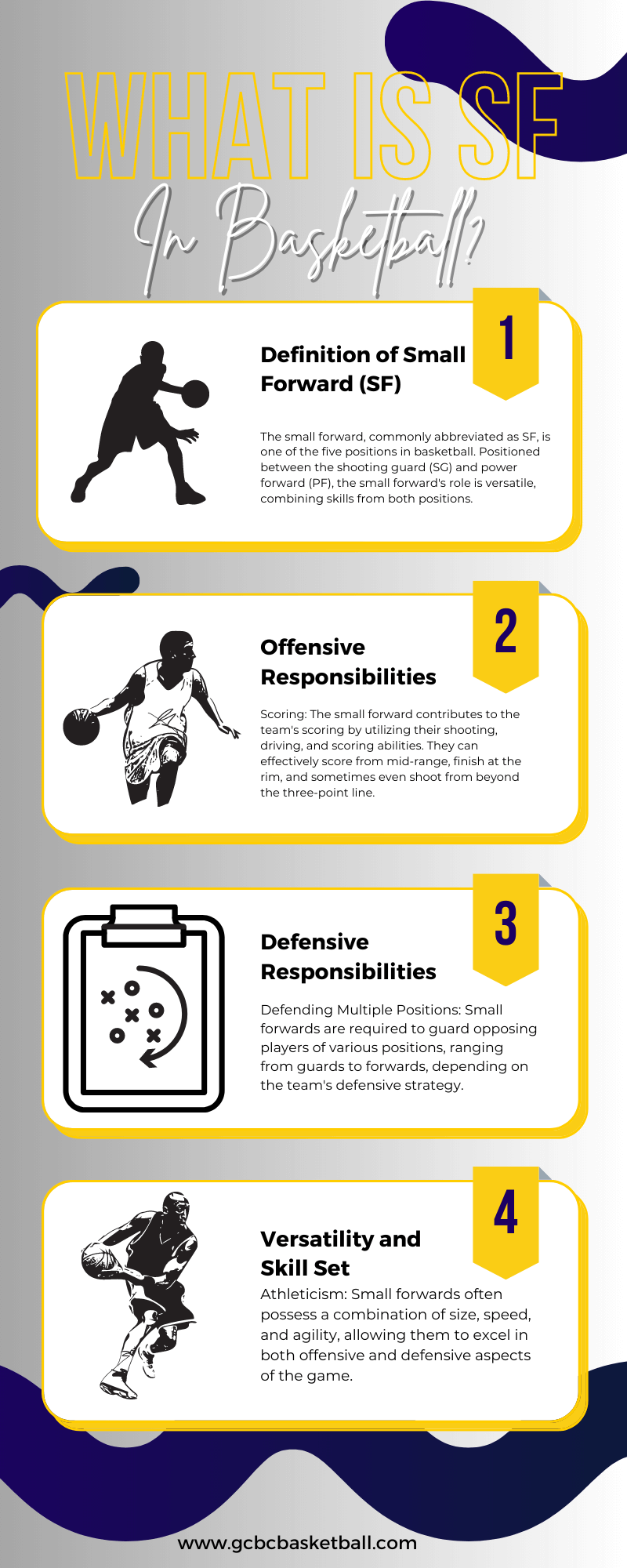
what does “sf†means in the offensive position?
In basketball, “SF” stands for “Small Forward.” The small forward is typically a versatile player who can score both inside and outside, play good defense, and often serves as a secondary scorer on the team.
Conclusion:
SF in basketball is an important position that requires a unique set of skills and attributes. Players must be able to shoot from all angles, handle the ball, drive to the basket, defend multiple positions, and rebound. Teams need a reliable SF who can contribute to the offense and defense. While all players have different individual strengths and weaknesses, coaches look for versatility in their SFs when evaluating potential team members. It is clear that SFs make a valuable contribution to any basketball team’s success.

Clyde Jackson III is a basketball coach and the founder of GCBC Basketball, a basketball-related learning and informational website that focuses on helping young players develop their skills on and off the court. With over 15 years of coaching experience, Clyde has worked with players of all ages and skill levels, from beginners to professionals.

